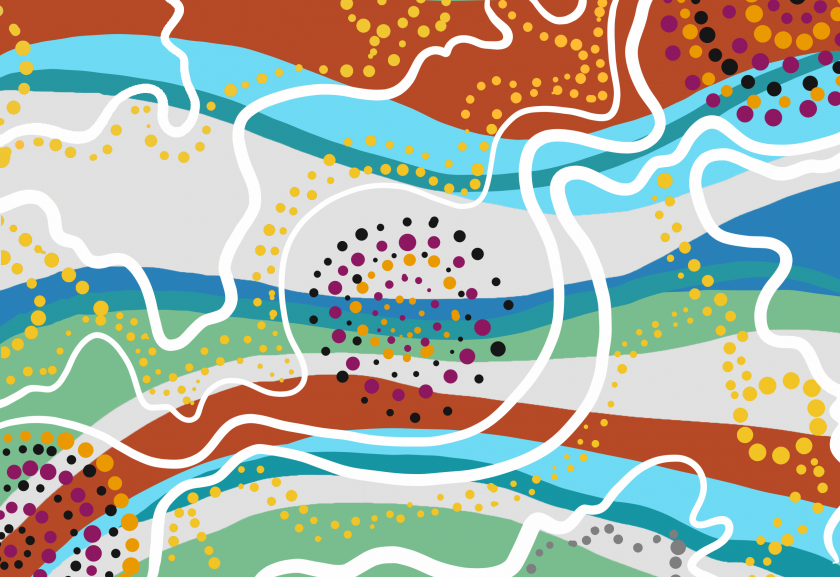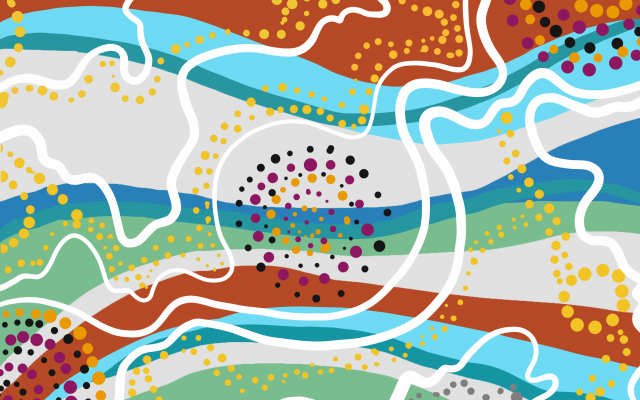
Creating culturally safe evaluation and research spaces
Recently Sally and Ken attended an AES seminar presented by Yamatji Naaguja man Doyen Radcliffe, Donna-Maree Stephens, an Iwaidja woman of the Muran clan and Sharon Babyack from Community First Development (CFD). The presenters reflected on some recent experiences engaging First Nations communities in remote parts of Western Australia and the wide differences in understanding of the term ‘Governance’ and how it is practically interpreted. In this blog, Sally and Ken share some of their key takeaways which have relevance to our work with Aboriginal and Torres Strait Islander people and communities.
COLLABORATION IS CRUCIAL
Community First Development is a First Nations community development and research organisation. They recently completed an Action Research Project in partnership with 11 First Nations’ communities located in Western Australia.
From the very beginning of their research, the CFD team set out to be led by the 11 communities they were seeking to engage and support and were driven by the expression ‘Nothing about us without us.’
This involved taking time to make sure the right steps were taken for true collaboration. CFD focussed on:
- respecting the concept of self-determination and recognising this is at the core of any engagements with local communities
- being prepared to invest lots of time up front in the research process to develop strong relationships, build trust and set out any ground rules
- having a side-by-side approach for engaging community members but also allowing for time to pause and reflect on the process and how it might be improved
- clearly explaining to community members both how and why they would benefit from engaging with CFD
- adhering to ethical research processes for working with and supporting Indigenous communities such as the ones set in the AIATSIS Code of Ethics
- adopting an organic rather than linear approach to community development and
- developing and using culturally appropriate questions and visual prompts for use when yarning with community members.
‘FAILING FORWARD’
As Action Researchers, the CFD team had a clear process of learning and changing their engagement and research techniques when they found they weren’t working as effectively as first hoped, or in their words ‘failing forward.’ Although they acknowledged that this was uncomfortable at times, it was critical to building two-way trust between community members and the CFD research team. They provided an example of changing up their semi-structured interview approach. Switching to a yarning style interview approach, often while out walking on the lands of the, the CFD team felt they were able to gather much richer qualitative data and gain stronger support from community members for their work. Generally, these conversations (as opposed to interviews) were less structured, are more personal and give the control to the person telling the story (as opposed to the interviewer asking the questions).
DIFFERENCES IN GOVERNANCE MODELS
Through their engagements, the CFD team realised there were quite diverse understandings and interpretations of the term ‘governance’ both within and between communities. The Western concept of governance with developed rules, compliance procedures and expectations can differ quite widely from community to community for Aboriginal and Torres Strait Islander people.
The presenters introduced the concept of ‘Right Way Governance’ developed by CFD. Right Way Governance involves a series of compromises between different structures to create a way of working with mutual trust and respect at its core, which has as key goals the development of stronger relationships and deeper connections.

Source: Community First Development
Development of such governance models within organisations takes time and work, but creates benefits by putting structures in place to help:
- navigate differences in people, concepts and terms, languages and reporting processes
- negotiate suitable timeframes and outcomes in line with community development outcomes of local communities
- recognise the necessity (and importance) of working to achieve beneficial, yet complex, social development outcomes that community members themselves have deemed important
- respect the importance of listening to community members.
CFD’s research found that many communities have set up their own development-focused boards and organisations focused on supporting aged care, education, health and media outcomes. Many members perform this role in a voluntary capacity but may not have had any training of experience in the role responsibilities required of a board member, particularly around their reporting, legal and financial obligations.
WHAT’S NEXT?
It is evident that more research and community development-focused work in this space is required. CFD’s research, and approach to their work, provides valuable lessons for us and other evaluators.
The importance of listening, facilitating consensus and working to navigate the complexities between Western and traditional governance models and styles really stood out for us. As the term implies, community development should really be informed by and led by community members themselves.
………………………….
Community First Development will soon be launching their Community Development Framework which can be viewed on their website. A range of research project reports and community case studies are also available on their website.
Principles and Practices for Partnerships with Aboriginal and Torres Strait Islander Organisations




